Computer Linguistics
The Computer Linguistics master's program is specialized in training qualified professionals in the field of computer linguistics. The focus is on developing linguistic software and systems to solve language-related problems, including translation programs, speech recognition systems, Uzbek speech synthesizers, software for morphological and semantic analysis of texts, creating linguistic ontologies, building electronic dictionaries, producing linguodidactic platforms, creating language corpora, and improving the Uzbek National Corpus. The program aims to equip professional linguists capable of effectively working in these areas, as well as developing software based on artificial intelligence, natural language processing (NLP), and building linguistic models.
Head of Department:
PhD in Philology, Associate Professor Botir Elov
Form of Education:
Two-year full-time program
Program Structure:
This program comprises a total of 120 credits.
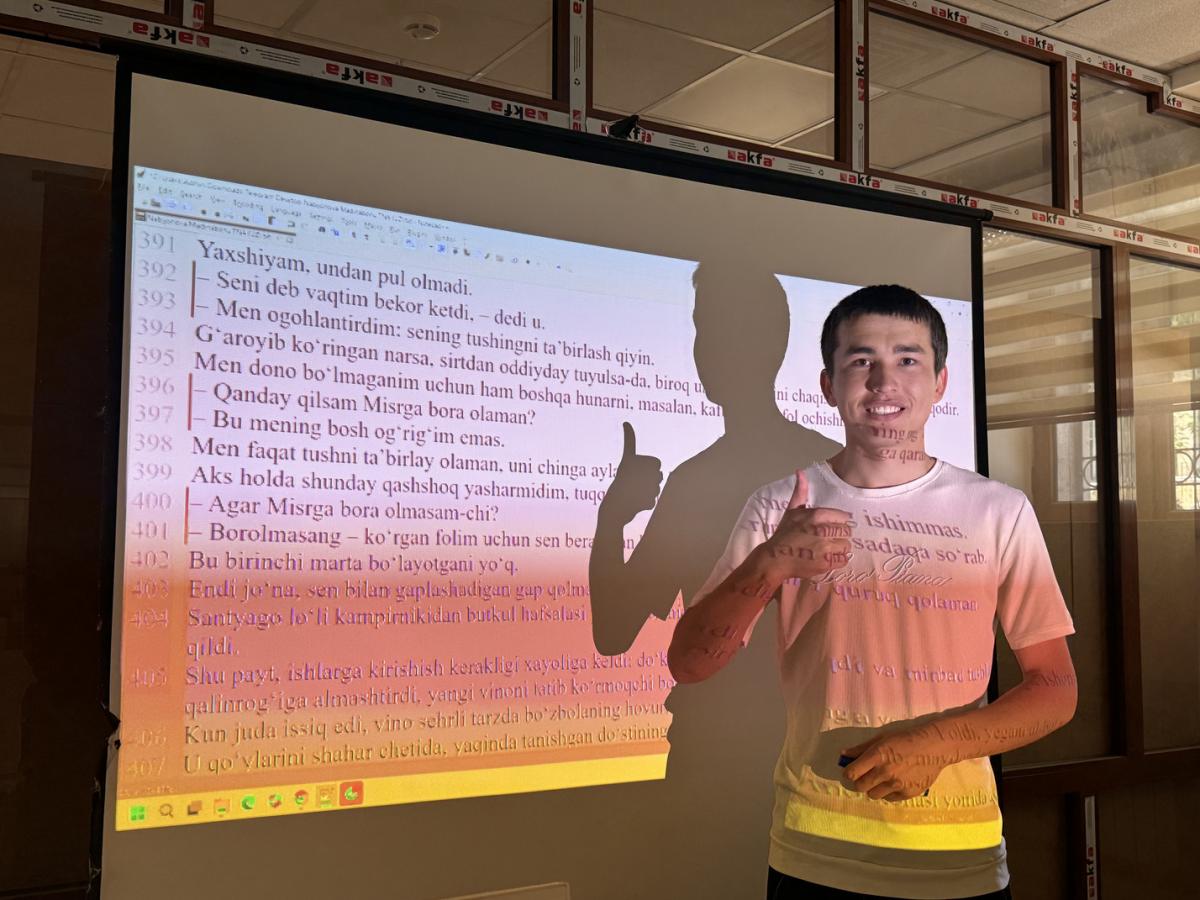
Modular Learning
Launching in 2025
Alisher Navoi Tashkent State University of Uzbek Language and Literature (TSUULL) is set to introduce modular learning at the University starting in 2025, offering a flexible and innovative approach to education.
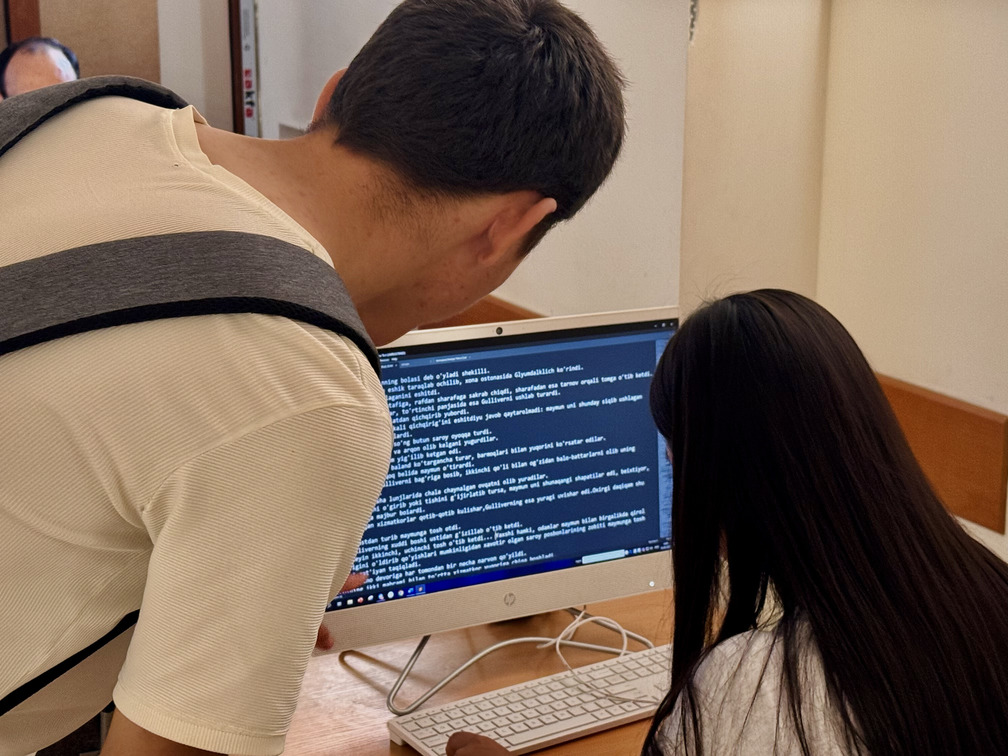
Why Choose the Master’s Program in Computer Linguistics at TSUULL?
This program is ideal for students who want to be at the intersection of language, technology, and innovation, and who aspire to build intelligent systems that understand and process human language.
Graduates of this program will be equipped with cutting-edge knowledge and practical skills in linguistic software development. You’ll gain hands-on experience with tools and methods that are shaping the future of language technology, including:
• Machine Learning for natural language processing
• Automatic Linguistic Annotation of texts
• Syntactic and Semantic Text Analysis
• Speech Recognition and Synthesis
• Machine Translation
• Text Understanding
• Designing Databases and Software with Linguistic Components
Flexible and Balanced Schedule
This two-year, full-time program is designed to fit your academic and research goals. Classes are held during the day, with flexible modules and research components tailored to your interests. The program includes around 7 core and specialized subjects, alongside academic research and thesis work. You’ll also have opportunities to participate in seminars, translation workshops, and independent study projects.
Key Areas of Study
The program focuses on developing linguistic software and systems to address complex language-related challenges.
• Machine Translation Systems
• Speech Recognition and Speech Synthesis (including Uzbek speech synthesis)
• Morphological and Semantic Text Analysis
• Linguistic Ontology Design
• Electronic Dictionary Development
• Linguodidactic Platform Creation
• Language Corpus Construction
• Uzbek National Corpus Development and Enhancement
In addition, students will explore foundational and advanced subjects such as:
• Natural Language Processing (NLP)
• Artificial Intelligence Applications in Linguistics
• Computational Morphology and Syntax
• Corpus Linguistics
• Semantic Web and Knowledge Representation
• Lexicography and Terminology Management
• Programming for Linguistic Application
This subject provides deep knowledge of the essential concepts of scientific knowledge such as method, methodology, and research design. It covers the necessary conditions for conducting research, topic selection, logical flow of research, literature review, and working on scientific articles and dissertations. Students gain experience in formatting research results and understanding the rules and standards of academic writing.
This course introduces the nature of linguistics and computer linguistics subjects, their teaching features, and approaches to solving applied problems. It develops logical thinking, scientific reasoning, and the ability to solve theoretical and practical issues in the field.
The course offers in-depth knowledge of NLP, morphological analyzers, tagging, linguistic annotation, semantic analyzers, syntactic analyzers, parsing, automatic syntactic analysis tools, and treebanks. Students learn the theory and practice of NLP, especially as applied to Uzbek linguistics, and develop the ability to model, test, and explain linguistic phenomena.
This course introduces theoretical issues in corpus linguistics, corpus building, the creation of the Uzbek National Corpus, linguistic annotation in corpora, development of tagging systems, electronic dictionaries in Turkic languages, parallel corpora, author corpora, and the creation of electronic atlases and platforms.
The course covers the Python programming language, Python libraries, algorithms, and techniques for searching, processing, and analyzing text data. It includes working with regular expressions, handling data in HTML and MS Excel formats, databases, files, directories, and different formats like HTML, CSV, XML, and TXT.
This subject provides deep knowledge of relational database creation, forming queries, data processing, and understanding database components and architecture. Students will gain expertise in database management systems, primary and secondary keys, indexes, triggers, transactions, cursors, views, procedures, functions, backups, and designing and supporting databases for information systems.
Career Opportunities
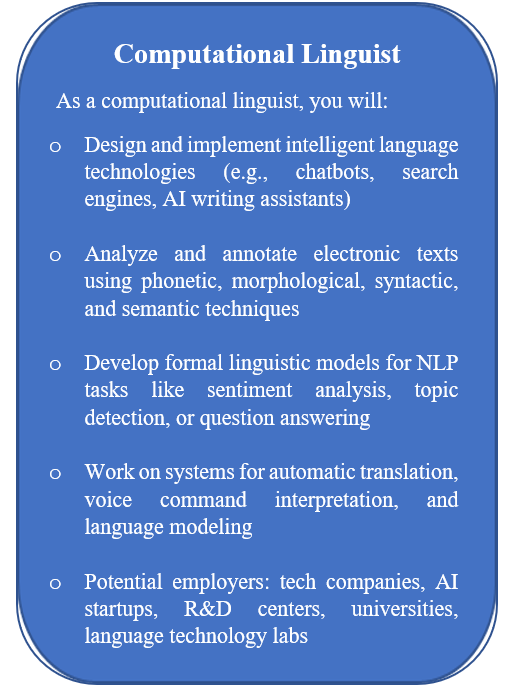
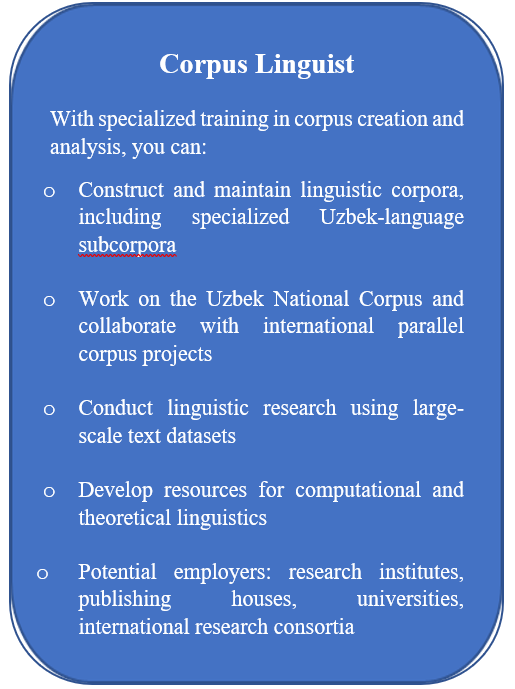
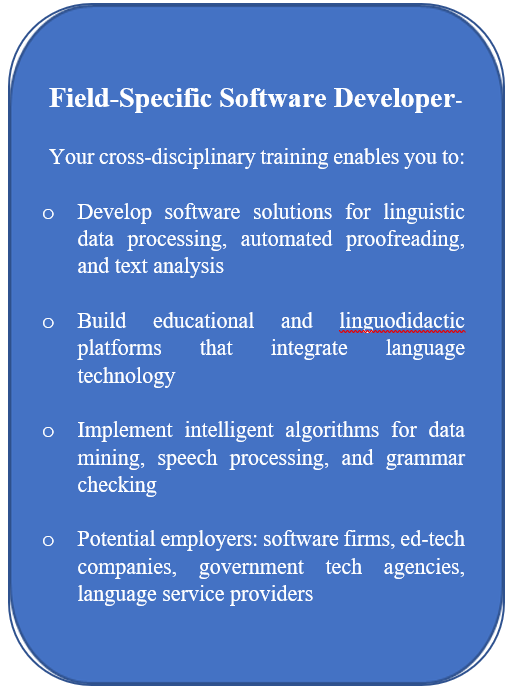
Fees&Scholarships
Indicative annual fee
$2000*
This indicative annual fee is based on one year study load of 120 credits
If you are a local student, you can apply through our TSUULL Application system which is free of charge.
Local students are:
• Uzbekistan Citizens
• Karakalpakistan Citizens
• Uzbekistan permanent residents
• Karakalpakistan permanent residents
Scholarships
At Alisher Navo’i Tashkent State University of Uzbek Language and Literature, we are proud to offer a range of scholarships that acknowledge students with a deep commitment to the Uzbek language, literature, and culture. Our scholarships reward those who demonstrate academic excellence, active engagement within their communities, and outstanding leadership. Through donor-funded support, we also ensure that scholarships are accessible to students based on their academic achievements and financial needs. Additionally, specific scholarships are available for degrees in translation, linguistics, and Uzbek literature, fostering excellence and dedication to advancing Uzbek language and literature studies.
FIND OUT MORE
Master’s Program – Frequently Asked Questions (FAQs)
1. How long is the master’s program?
The Master’s program at TSUULL is 2 years (full-time). The curriculum is structured to deepen your academic and practical knowledge, combining advanced coursework with hands-on projects, research, and specialization in areas such as computer linguistics, language teaching, or translation studies.
2. How are students assessed?
Assessment methods in the master’s program are varied and aligned with real-world professional practices. These include:
• Research papers & presentations
• Project-based work
• Practical tasks (e.g., software development or linguistic analysis)
• Portfolios & case studies
• Final thesis/dissertation
Small, interactive classes allow for personalized feedback and support from faculty members throughout your studies.
3. Can I transfer from another master’s program or university?
Yes. TSUULL welcomes credit transfer applications from students who have begun relevant graduate studies elsewhere. Transfer eligibility is evaluated based on academic transcripts and program compatibility. Contact the admissions office for personalized guidance.
4. What are the career prospects after completing this master’s program?
Graduates of TSUULL’s master’s programs are equipped for a wide range of careers, including:
• Language Technology & AI (e.g., NLP developer, speech tech specialist)
• Academic & Applied Linguistics
• Translation & Localization
• International Education & Policy
• Media, Publishing & Cultural Affairs
Employers value our graduates for their research skills, language expertise, and ability to apply linguistics to real-world challenges.
5. Are scholarships available for international students?
Yes. TSUULL offers a range of merit-based scholarships for foreign students. These are awarded based on academic excellence and professional achievements. Early application is recommended, and candidates should consult the admissions office for up-to-date scholarship criteria and deadlines.
6. Does TSUULL provide internship or study abroad opportunities?
Absolutely. TSUULL has partnerships with universities and research centers worldwide, enabling master’s students to participate in:
• Exchange programs
• International conferences
• Industry internships
• Joint research initiatives
• These experiences provide global perspectives and valuable professional exposure aligned with your academic focus.
TSUULL has been included in the QS World University Rankings 2025, earning a spot in the 301–350 range in the Modern Languages category.
This recognition reflects the university’s strong performance in areas such as academic reputation, employer opinion, research output, and international collaboration.